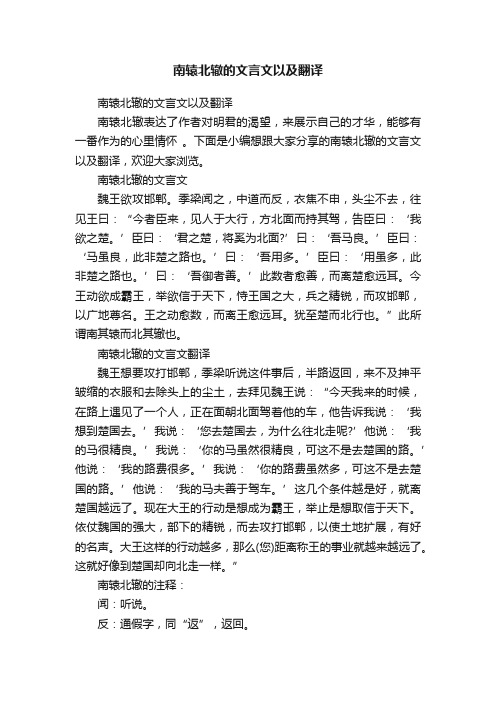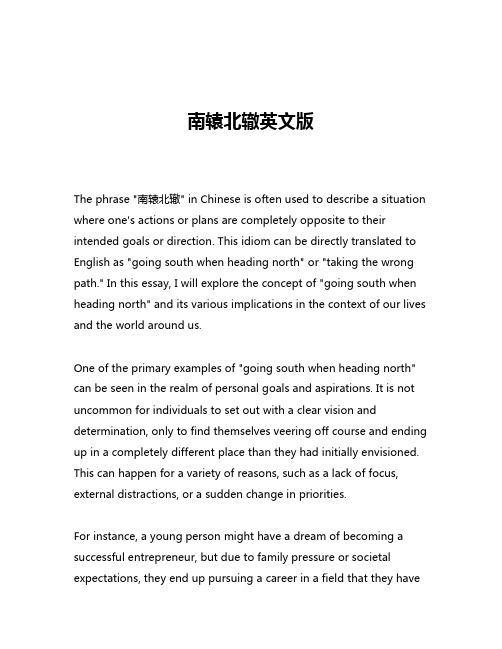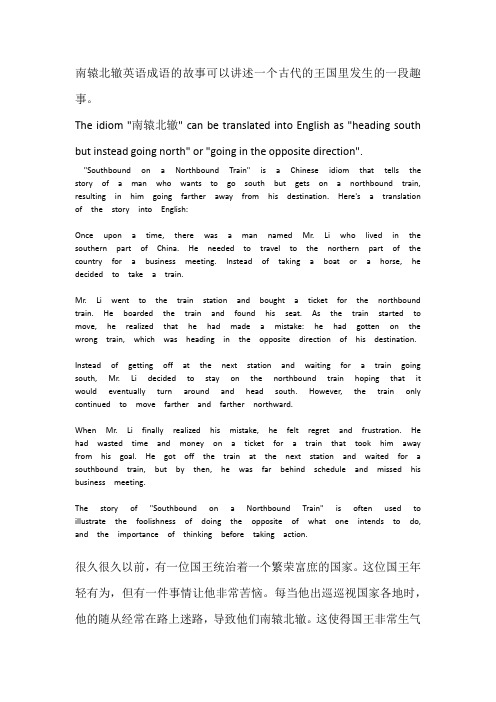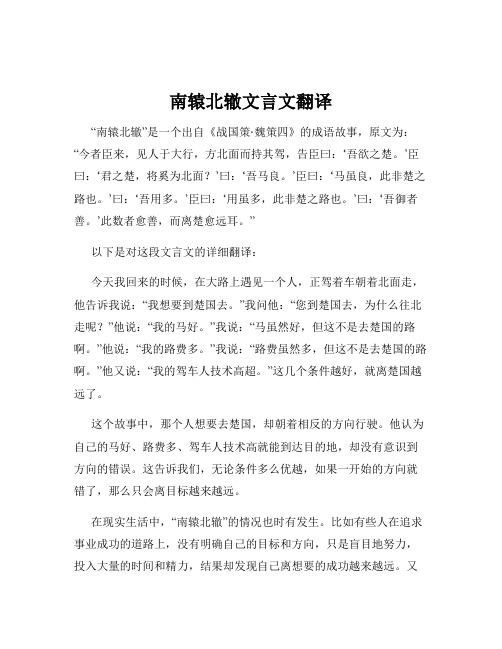南辕北辙成语故事(中英文版)
南辕北辙的成语故事典故_字词解析_造句

南辕北辙的成语故事典故_字词解析_造句南辕北辙的典故:从前有一个人,他想从魏国到楚国去。
他带上很多的盘缠,雇了上好的车,驾上骏马,请了驾车技术精湛的车夫,然后上路了。
楚国在魏国的南面,可这个人也奇怪,他不问青红皂白竟让驾车人赶着马车一直向北走去。
路上有人问他的车是要往哪儿去,他大声地回答说:“去楚国!”一位好心的路人告诉他说:“到楚国去应往南方走,你这是在往北走,方向不对。
”可那人却满不在乎地说:“没关系,我的马快着呢!”路人替他着急,拉住他的马,阻止他说:“方向错了,你的马再快,也到不了楚国呀!”那人依然毫不醒悟地说:“不要紧,我带的路费多着呢!”路人极力劝阻他说:“虽说你路费多,可是你走的不是那个方向,你路费再多也只能白花呀!”那个一心只想着要到楚国去的人有些不耐烦了,他说:“这有什么难的,我的车夫赶车的本领高着呢!”路人无奈,只好松开了拉住车把子的手,眼睁睁看着那个盲目上路的魏人走了。
那个魏国人,不听别人的指点劝告,仗着自己的马快、钱多、车夫好等优越条件,朝着相反方向一意孤行。
可是他条件越好,他就只会离要去的地方越远,因为他的大方向完全弄错了……南辕北辙的汉语词典解释:1. 要到南方去,却驾着车往北走。
比喻行动和目的相反。
●清魏源《<书古微>序》:「南辕北辙,诬圣师心,背理害道,不可胜数。
」●于晴《批评和量文的尺》一:「用这种总结报告的内容要求于文学作品,就不免南辕北辙了。
」2. 指北来的车和南来的车。
●清赵翼《上元后三日芷堂过访草堂,次日梦楼亦至,喜而有作》诗之一:「鹊噪晴檐噪有因,南辕北辙聚兹晨。
」原注:「芷堂自云间来,梦楼自京口至。
」南辕北辙的近义词/反义词如下:近义词:背道而驰、南山有鸟、天南地北、各走各路、相背而行、救经引足反义词:瞻予马首、马首是瞻、异途同归、殊途同归用南辕北辙造句:(1) 只有目标明确,才不会南辕北辙。
(2) 他俩的个性南辕北辙,根本谈不拢。
(3) 如今我的生活方式和原本的构想,可说是南辕北辙,全不相干。
南辕北辙的成语故事

南辕北辙的成语故事
战国时代,魏国的大夫季梁要到赵国去。
旅途中忽然听到魏王想发兵攻打赵国的消息。
为了制止魏王攻打赵国,他匆忙地半途转身回魏国。
季梁回到魏国,便去见魏王。
说道:「我来的路上,在赵太行山下遇到了一个人,他乘着一辆马车由南向北行驶,却跟我说他要到楚国去。
」
我觉得他走的方向不对,便说:「您到楚国去,为什么不朝南走反而向北去呢?难道你不知道楚国在南边吗?」
他却说:「没关系,我有一匹好马。
」
我说:「你的马虽然好,可你走的并不是去楚国的路呀?」
那乘车人又说:「不要紧,我带的路费多,又有一个赶车本领很高的马夫,一定会到达楚国的。
」
我告诉他:「你的这些条件再好,如果朝北去,离楚国也只能是越走越远呀!」
魏王听了季梁讲的故事,觉得可笑,说道:「天下难道真有这样糊涂的人吗?」
季梁说:「有,不光赵国有,我们魏国也有。
比如魏王你吧,你的志向是建霸业,当诸侯的首领。
为此目的,你倚仗着国家的强大与军队的精良,想利用攻打赵国的办法,来扩大地盘和抬高威望。
可你这样做,别的国家会怎样想呢?正如这个人想到楚国,却驾着车子往北去一样。
」
魏王一听,脸都红了,于是停止攻打赵国。
「南辕北辙」这个成语出自《战国策·魏策四》。
比喻行动与目标相违背。
南辕北辙的文言文以及翻译

南辕北辙的文言文以及翻译南辕北辙的文言文以及翻译南辕北辙表达了作者对明君的渴望,来展示自己的才华,能够有一番作为的心里情怀。
下面是小编想跟大家分享的南辕北辙的文言文以及翻译,欢迎大家浏览。
南辕北辙的文言文魏王欲攻邯郸。
季梁闻之,中道而反,衣焦不申,头尘不去,往见王曰:“今者臣来,见人于大行,方北面而持其驾,告臣曰:‘我欲之楚。
’臣曰:‘君之楚,将奚为北面?’曰:‘吾马良。
’臣曰:‘马虽良,此非楚之路也。
’曰:‘吾用多。
’臣曰:‘用虽多,此非楚之路也。
’曰:‘吾御者善。
’此数者愈善,而离楚愈远耳。
今王动欲成霸王,举欲信于天下,恃王国之大,兵之精锐,而攻邯郸,以广地尊名。
王之动愈数,而离王愈远耳。
犹至楚而北行也。
”此所谓南其辕而北其辙也。
南辕北辙的文言文翻译魏王想要攻打邯郸,季梁听说这件事后,半路返回,来不及抻平皱缩的衣服和去除头上的尘土,去拜见魏王说:“今天我来的时候,在路上遇见了一个人,正在面朝北面驾着他的车,他告诉我说:‘我想到楚国去。
’我说:‘您去楚国去,为什么往北走呢?’他说:‘我的马很精良。
’我说:‘你的马虽然很精良,可这不是去楚国的路。
’他说:‘我的路费很多。
’我说:‘你的路费虽然多,可这不是去楚国的路。
’他说:‘我的马夫善于驾车。
’这几个条件越是好,就离楚国越远了。
现在大王的行动是想成为霸王,举止是想取信于天下。
依仗魏国的强大,部下的精锐,而去攻打邯郸,以使土地扩展,有好的名声。
大王这样的行动越多,那么(您)距离称王的事业就越来越远了。
这就好像到楚国却向北走一样。
”南辕北辙的注释:闻:听说。
反:通假字,同“返”,返回。
衣焦:衣裳皱缩不平。
申:伸展,舒展。
后作“伸”。
大行(hang):大路。
方:正在。
北:面向北方。
持其驾:驾着他的车。
之:动词,到……去。
楚:楚国,在魏国的南面。
将:又。
奚:为何。
用:费用,钱财。
御:驾驭车马。
者:…的人。
御者善:车夫驾车的技术高超。
此数者:这几个条件。
恃:依靠,依仗。
南辕北辙英文版

南辕北辙英文版The phrase "南辕北辙" in Chinese is often used to describe a situation where one's actions or plans are completely opposite to their intended goals or direction. This idiom can be directly translated to English as "going south when heading north" or "taking the wrong path." In this essay, I will explore the concept of "going south when heading north" and its various implications in the context of our lives and the world around us.One of the primary examples of "going south when heading north" can be seen in the realm of personal goals and aspirations. It is not uncommon for individuals to set out with a clear vision and determination, only to find themselves veering off course and ending up in a completely different place than they had initially envisioned. This can happen for a variety of reasons, such as a lack of focus, external distractions, or a sudden change in priorities.For instance, a young person might have a dream of becoming a successful entrepreneur, but due to family pressure or societal expectations, they end up pursuing a career in a field that they havelittle passion for. Instead of following their entrepreneurial aspirations, they find themselves trapped in a corporate job that leaves them feeling unfulfilled and disconnected from their true purpose. This is a classic case of "going south when heading north," where the individual's actions and choices have led them away from their original goal.Similarly, in the realm of relationships, people can often find themselves in situations where their actions and decisions are misaligned with their desired outcomes. A couple might start a relationship with the intention of building a lasting, loving partnership, but due to communication breakdowns, unresolved conflicts, or a lack of mutual understanding, they end up drifting apart and eventually going their separate ways. This too can be seen as a case of "going south when heading north," where the couple's efforts to maintain and nurture their relationship have fallen short of their initial aspirations.The concept of "going south when heading north" is not limited to personal experiences; it can also be observed in broader societal and global contexts. For example, consider the issue of climate change and environmental sustainability. Despite the overwhelming scientific evidence and the urgent need to address this pressing global challenge, many governments, industries, and individuals continue to make decisions and implement policies that are ultimatelycounterproductive to the goal of environmental preservation and climate action.Instead of investing in renewable energy sources, promoting sustainable practices, and reducing our carbon footprint, we often see a continued reliance on fossil fuels, the expansion of environmentally damaging industries, and a lack of meaningful action to mitigate the impacts of climate change. This disconnect between our stated intentions to protect the planet and our actual behaviors and choices is a prime example of "going south when heading north."Another instance of "going south when heading north" can be found in the realm of global politics and international relations. Despite the widespread desire for peace, stability, and cooperation among nations, we often witness conflicts, tensions, and the pursuit of narrow self-interests that undermine the broader goals of global harmony and shared prosperity. Leaders and policymakers may claim to prioritize diplomatic solutions and multilateral cooperation, but their actions and decisions can sometimes lead to escalating tensions, the erosion of trust, and the perpetuation of cycles of conflict.This disconnect between the rhetoric of peace and the reality of ongoing geopolitical strife is a prime example of "going south when heading north," where the aspirations for a more peaceful andcooperative world are not fully realized in practice.The concept of "going south when heading north" is not merely an abstract idea; it has very real and tangible consequences for individuals, communities, and the global community as a whole. When we find ourselves veering off course and moving in the opposite direction of our intended goals, it can lead to a sense of frustration, disappointment, and even a loss of purpose and direction.At the individual level, this disconnect between our intentions and actions can result in unfulfilled dreams, strained relationships, and a general feeling of dissatisfaction with our lives. In the broader societal and global contexts, the inability to align our collective actions with our shared aspirations can have far-reaching implications, such as the exacerbation of environmental degradation, the perpetuation of social and economic inequalities, and the erosion of trust and cooperation among nations.However, it is important to recognize that the phenomenon of "going south when heading north" is not necessarily a permanent or insurmountable condition. By acknowledging the disconnect between our intentions and our actions, and by actively working to realign our behaviors and decisions with our desired outcomes, we can strive to overcome this challenge and move closer to our goals.This may involve a process of self-reflection, the reassessment of our priorities, and the development of more effective strategies and plans of action. It may also require a collective effort, where individuals, communities, and global institutions come together to address the systemic issues that contribute to the "going south when heading north" dynamic.In conclusion, the concept of "going south when heading north" is a powerful metaphor that highlights the disconnect between our aspirations and our actions, both at the individual and the collective level. By recognizing and addressing this disconnect, we can work towards aligning our behaviors and decisions with our desired outcomes, and ultimately, move closer to the realization of our goals and the betterment of our world.。
英语 成语故事 南辕北辙

南辕北辙英语成语的故事可以讲述一个古代的王国里发生的一段趣事。
The idiom "南辕北辙" can be translated into English as "heading south but instead going north" or "going in the opposite direction"."Southbound on a Northbound Train" is a Chinese idiom that tells the story of a man who wants to go south but gets on a northbound train, resulting in him going farther away from his destination. Here's a translation of the story into English:Once upon a time, there was a man named Mr. Li who lived in the southern part of China. He needed to travel to the northern part of the country for a business meeting. Instead of taking a boat or a horse, he decided to take a train.Mr. Li went to the train station and bought a ticket for the northbound train. He boarded the train and found his seat. As the train started to move, he realized that he had made a mistake: he had gotten on the wrong train, which was heading in the opposite direction of his destination.Instead of getting off at the next station and waiting for a train going south, Mr. Li decided to stay on the northbound train hoping that it would eventually turn around and head south. However, the train only continued to move farther and farther northward.When Mr. Li finally realized his mistake, he felt regret and frustration. He had wasted time and money on a ticket for a train that took him away from his goal. He got off the train at the next station and waited for a southbound train, but by then, he was far behind schedule and missed his business meeting.The story of "Southbound on a Northbound Train" is often used to illustrate the foolishness of doing the opposite of what one intends to do, and the importance of thinking before taking action.很久很久以前,有一位国王统治着一个繁荣富庶的国家。
南辕北辙英文故事

南辕北辙英文故事"The Ox Herding Tale" is a famous Zen Buddhist story that can be interpreted as "Going South while facing North".The story goes like this:Once upon a time, a young man set out on a journey to find enlightenment. He encountered an ox in a field, and with great effort, he tamed it and rode it to his destination.However, he lost sight of his true goal and became attached to the comfort and convenience of riding the ox. One day, he looked back to see the ox carrying him in the wrong direction.Realizing his mistake, the man got off the ox and started walking in the opposite direction. He faced many obstacles and challenges, but he persisted. Finally, he came to a beautiful town where he found peace and enlightenment.In this story, the ox represents our own ego and attachments. The young man's journey of going south while facing north represents the struggle to let go of our egos and move towards our true goal, despite the challenges and obstacles we may face.。
南辕北辙这个成语比喻什么

南辕北辙的成语故事战国后期,一度称雄天下的魏国国力渐衰,可是国君魏安厘王仍想出兵攻打赵国(邯郸)。
正出使别国的谋臣季梁听到这个消息后,走到半路赶紧返回来,衣服上的皱折顾不得整理平整,脸上的尘土也顾不得洗干净,就急急忙忙去见魏安厘王,进行劝阻。
【今译】魏王攻打赵国。
他看到季良满脸尘土,很惊讶地问他:“你为什么这么急着来见我?”连外套和帽子都没有?”季良说:“大王,我刚才在路上碰到一件怪事。
快来告诉国王。
”魏王很好奇,问他这是怎么回事。
季良说:“从别处回来的路上,我遇见一个人坐在太行山脚下的马车里,面朝北。
他告诉我他要到楚国去。
我对他说:“如果你想去楚国,你应该向南方去。
你要往北走,方向不对。
”那人漫不经心地说:“没关系。
我的马跑得很快。
”我为他担心,拉住他的马,阻止他说:“方向错了,你的马再快,也到不了楚国呀!”那人说:“没关系,我带的路费多着呢!”我说:“虽说你路费多,可是你走的不是那个方向,你路费多也只能白花呀!”那个一心只想着要到楚国去的人有些不耐烦地说:“这有什么难的,我的车夫赶车的本领高着呢!”我只好无奈地松开了拉住车把子的手,眼睁睁看着那个盲目上路的魏人在马车的带领下,一直向北走去。
那个魏国人,不听劝告,仗着自己的马快、钱多、车夫好等优越条件,固执地朝着相反的方向走。
他条件越好,他就只会离要去的地方越远,因为他的大方向错了。
”季梁偷偷观看了一下魏王的脸色后,接着说:“现在大王动不动就想称霸,依仗自己的国家和军队强大,就去攻打赵国,想扩展地盘,抬高声威。
可是,您知道吗?您这样的行动越多,距离统一天下为王的目标就越远,这正像要去楚国却向北走的行为一样啊!”魏王这才明白,原来季梁是在绕着圈子劝说自己。
他低头默默地想了一会儿,觉得季梁说的有道理,于是取消了攻打赵国的计划。
由这个故事,就产生了成语“南辕北辙”。
成语:南辕北辙拼音:nán yuán běi zhé释义:辕:车子前面驾牲畜的横木,引申指车;想到达南方,车子却向北行。
南辕北辙文言文翻译

南辕北辙文言文翻译“南辕北辙”是一个出自《战国策·魏策四》的成语故事,原文为:“今者臣来,见人于大行,方北面而持其驾,告臣曰:‘吾欲之楚。
’臣曰:‘君之楚,将奚为北面?’曰:‘吾马良。
’臣曰:‘马虽良,此非楚之路也。
’曰:‘吾用多。
’臣曰:‘用虽多,此非楚之路也。
’曰:‘吾御者善。
’此数者愈善,而离楚愈远耳。
”以下是对这段文言文的详细翻译:今天我回来的时候,在大路上遇见一个人,正驾着车朝着北面走,他告诉我说:“我想要到楚国去。
”我问他:“您到楚国去,为什么往北走呢?”他说:“我的马好。
”我说:“马虽然好,但这不是去楚国的路啊。
”他说:“我的路费多。
”我说:“路费虽然多,但这不是去楚国的路啊。
”他又说:“我的驾车人技术高超。
”这几个条件越好,就离楚国越远了。
这个故事中,那个人想要去楚国,却朝着相反的方向行驶。
他认为自己的马好、路费多、驾车人技术高就能到达目的地,却没有意识到方向的错误。
这告诉我们,无论条件多么优越,如果一开始的方向就错了,那么只会离目标越来越远。
在现实生活中,“南辕北辙”的情况也时有发生。
比如有些人在追求事业成功的道路上,没有明确自己的目标和方向,只是盲目地努力,投入大量的时间和精力,结果却发现自己离想要的成功越来越远。
又比如在学习中,有些同学没有掌握正确的学习方法,虽然花费了很多时间做题、背书,但成绩却没有明显提高。
再从企业发展的角度来看,有的企业在制定战略时,没有充分考虑市场需求和自身的实际情况,盲目追求扩张和多元化,最终导致经营困难,甚至破产。
这就像那个想要去楚国却往北走的人一样,方向错误,再多的资源和努力也无济于事。
而在人际交往中,也可能出现“南辕北辙”的情况。
比如两个人在沟通时,没有理解对方的真正意图,只是自说自话,结果导致误解加深,关系变得紧张。
要避免“南辕北辙”的情况发生,我们首先要有明确的目标和方向。
在做任何事情之前,都要认真思考自己的目的是什么,然后选择正确的道路和方法。
- 1、下载文档前请自行甄别文档内容的完整性,平台不提供额外的编辑、内容补充、找答案等附加服务。
- 2、"仅部分预览"的文档,不可在线预览部分如存在完整性等问题,可反馈申请退款(可完整预览的文档不适用该条件!)。
- 3、如文档侵犯您的权益,请联系客服反馈,我们会尽快为您处理(人工客服工作时间:9:00-18:30)。
南辕北辙成语故事(中英文版)
南辕北辙,意思就是背道而驰。
故事中的那个人,思想不仅糊涂,而且顽固。
以下是小编整理的南辕北辙成语故事(中英文版),欢迎阅读。
南辕北辙成语故事(中文版)从前有一个人,从魏国到楚国去。
他带上很多的盘缠,雇了上好的车,驾上骏马,请了驾车技术精湛的车夫,就上路了。
楚国在魏国的南面,可这个人不问青红皂白让驾车人赶着马车一直向北走去。
路上有人问他的车是要往哪儿去,他大声回答说:“去楚国!”路人告诉他说:“到楚国去应往南方走,你这是在往北走,方向不对。
”那人满不在乎地说:“没关系,我的马快着呢!”路人替他着急,拉住他的马,阻止他说:“方向错了,你的马再快,也到不了楚国呀!”那人依然毫不醒悟地说:“不要紧,我带的路费多着呢!”路人极力劝阻他说:“虽说你路费多,可是你走的不是那个方向,你路费多也只能白花呀!”那个一心只想着要到楚国去的人有些不耐烦地说:“这有什么难的,我的车夫赶车的本领高着呢!”路人无奈,只好松开了拉住车把子的手,眼睁睁看着那个盲目上路的魏人走了。
那个魏国人,不听别人的指点劝告,仗着自己的马快、钱多、车夫好等优越条件,朝着相反方向一意孤行。
那么,他条件越好,他就只会离要去的地方越远,因为他的大方向错了。
这个故事告诉我们,无论做什么事,都要首先看准方向,才能充
————来源网络搜集整理,仅供个人学习查参考
分发挥自己的有利条件;如果方向错了,那么有利条件只会起到相反的作用。
南辕北辙成语故事(英文版)Once a man wanted to go to the south, but his carriage was heading north. A passer-by asked him:"If you are going to south, why is your chariot heading north?" The ma answered, "My horse is good at running, My driver is highly skilled at driving a carriage, ad I have enough money."The man didint consider that the direction might be wrong; the better his conditions were, ther further he was away from his destination.
The idiom derived froim this story indicates that one's action was the opposite effect to one's intention.
【拓展延伸】
【原文】
魏王欲攻邯郸。
季梁闻之,中道而返。
衣焦不申,头尘不去,往见王曰:今者臣来,见人于太行,方北面而持其驾,告臣曰:我欲之楚。
臣曰:君之楚将奚为北面?曰:吾马良!臣曰:马虽良,此非楚之路也。
曰:吾用多!臣曰:用虽多,此非楚之路也。
曰:吾御者善!此数者愈善,而离楚愈远耳。
今王动欲成霸王,举欲伸于天下。
恃王国之大,兵之精锐,而攻邯郸以广地尊名。
王之动愈数,而离王愈远耳。
犹至楚而北行也!
【字释】
魏──战国时代国名,疆域在现今河南省北部、山西省西南部一带地区。
邯郸──音汗丹,战国时代赵国的都城,在现今河北省邯郸县西南一带。
太行──就是太行山,座落在山西与河北、河南两省的交界处。
驾──驾驭,这里作名词用,就是车。
之──文言动词,就是去、到的意思。
用──费用,这里指资产、钱财。
御者──古代称车夫为御者,就是驾赶马车的人。
伸──伸张,这里指扩展势力。
数──音朔,次数多的意思。
王──王天下,就是称霸天下,成为诸侯的领袖。
